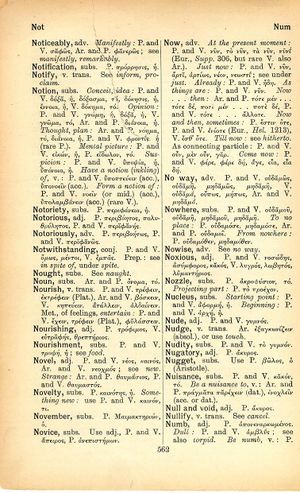notion
Ἀναξαγόρας δύο ἔλεγε διδασκαλίας εἶναι θανάτου, τόν τε πρὸ τοῦ γενέσθαι χρόνον καὶ τὸν ὕπνον → Anaxagoras used to say that we have two teachers for death: the time before we were born and sleep | Anaxagoras said that there are two rehearsals for death: the time before being born and sleep
English > Greek (Woodhouse)
subs.
Conceit, idea: P. and V. δόξα, ἡ, δόξασμα, τό, δόκησις, ἡ, ἔννοια, ἡ, V. δόκημα, τό. Opinion: P. and V. γνώμη, ἡ, δόξα, ἡ, V. γνῶμα, τό, Ar. and P. διάνοια, ἡ. Thought, plan: Ar. and P. νόημα, τό, διάνοια, ἡ, P. and V. φροντίς, ἡ (rare P.). Mental picture: P. and V. εἰκών, ἡ, P. εἴδωλον, τό. Suspicion: P. and V. ὑποψία, ἡ, ὑπόνοια, ἡ. Have a notion (inkling) of, v.:P. and V. ὑποπτεύειν (acc.), ὑπονοεῖν (acc.). Form a notion of: P. and V. νοεῖν (or mid.) (acc.), ὑπολαμβάνειν (acc.) (rare V.).
Latin > English (Lewis & Short)
nŏtĭon: ii, n.,
I a plant, otherwise called cucumis silvaticus, App. Herb. 113.
Latin > French (Gaffiot 2016)
nŏtĭon, ĭī, n., concombre sauvage : Ps. Apul. Herb. 113.

